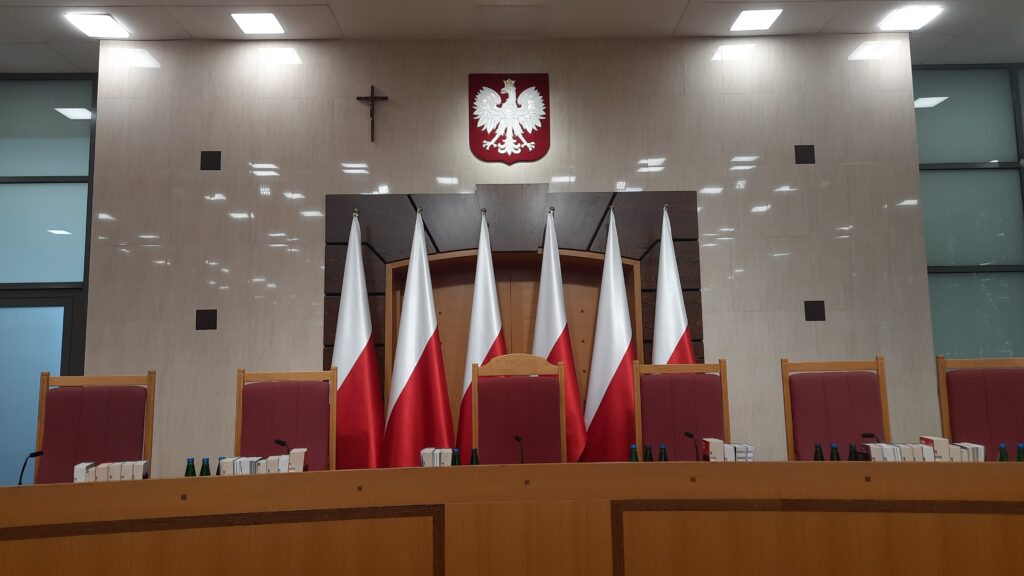Since March 2024, Donald Tusk’s government has refused to recognise the rulings of the Constitutional Tribunal concerning the constitutional rights and freedoms of Polish citizens. It also attempts to undermine the status of the National Council of the Judiciary, the only body which, according to the Polish Constitution, can propose candidates to the President for appointment to the position of judge of a court of general jurisdiction. One of the examples of the government’s fight against these bodies, which are the guardians of judicial independence, was a significant cut in their funding in the 2025 budget law.
Today (6 May 2025), at a hearing in case K 2/25, the Constitutional Tribunal ruled that the current budget act for 2025 of 9 January 2025 is unconstitutional insofar as it prevents the Constitutional Tribunal and the National Council of the Judiciary from performing their constitutional duties.
The proceedings were initiated at the request of the President of the Republic of Poland. This request was supported by the National Council of the Judiciary. The President pointed to the circumstances in which the budget act for 2025 was adopted. Initially, the draft budget act submitted to the Sejm provided for securing adequate funds for both the Constitutional Tribunal and the National Council of the Judiciary (in accordance with Article 139 of the Public Finance Act, the government must include in the draft budget bill the revenues and expenditures – without any modifications – submitted by bodies that enjoy so-called ‘budgetary autonomy,’ which include, among others, the Constitutional Tribunal and the National Council of the Judiciary). However, on 21 November 2024, at a meeting of the Public Finance Committee of the Sejm, an amendment to the draft was adopted which significantly reduced the amount of funds allocated to both the Constitutional Tribunal (by almost PLN 11 million) and the National Council of the Judiciary (by approximately PLN 6.5 million). It is worth noting here that these reductions in practice meant a decrease in funds allocated for benefits to individuals (i.e. mainly salaries for judges and other employees of both bodies) by almost 60% in the case of the Constitutional Tribunal and by almost 90% in the case of the National Council of the Judiciary. In reality, this measure was intended to paralyse the work of both the Constitutional Tribunal and the National Council of the Judiciary and, as a consequence, force their members to resign from their positions.
The Tribunal upheld the request. In his oral justification of the judgment, the rapporteur, Bogdan Święczkowski, President of the Constitutional Tribunal, emphasised that the Constitution does not deprive the Tribunal of the possibility of examining the constitutionality of the budget act.
He pointed out that while the government and parliament were given considerable leeway in shaping the budget, this must nevertheless remain within the limits of other legal norms. These include the requirement to include in the budget act legally determined expenditures, i.e. those which the government is obliged to incur under specific laws. The rapporteur emphasised that such expenditure undoubtedly includes the expenditure of the Constitutional Tribunal and the National Council of the Judiciary, which are bodies performing constitutional duties.
He also pointed out that the budget act must provide these bodies with adequate financial guarantees, i.e.:
• sufficient funds to enable the continuous and efficient performance of their tasks in the long term,
• sufficient funds to meet their contractual financial obligations (such as judges’ salaries and staff wages) in a timely manner,
• the possibility of adequately preparing for any sudden changes in the funds available to them.
The rapporteur added to this last point that such drastic changes in the amount of funds allocated to constitutional bodies, as adopted in the final budget, would be permissible only if there were significant changes to the Constitution or at least to the laws defining the tasks and powers of these bodies. However, this was not the case here. Both the Constitutional Tribunal and the National Council of the Judiciary were essentially surprised by the cuts to their funding, as the budget act came into force during the new budget year (on 20 January – until that point, for almost a month, these bodies had been operating on the basis of a draft budget which secured adequate funding for them).
From an overall view of the case, it is clear that the aim of the parliamentary majority that adopted the budget in its current form was not to seek savings, but to restrict the ability of the authorities to perform their constitutional functions. This, in the opinion of the Tribunal, constitutes a flagrant violation of Article 10(1) of the Constitution, which states that: The system of the Republic of Poland shall be based on the division and balance of legislative, executive and judicial powers.
The rapporteur also emphasised that, with regard to the reduction of the Constitutional Tribunal’s budget, the budget act is directly contrary to Article 195(2) of the Constitution, which states that: Judges of the Constitutional Tribunal shall be guaranteed working conditions and remuneration commensurate with the dignity of their office and the scope of their duties.
With regard to the effects of the judgment, the rapporteur emphasised that the budget law had not been repealed. Instead, the judgment imposes on the legislature (the Sejm) the obligation to amend the law without delay so as to ensure the necessary resources for the normal functioning of the Constitutional Tribunal and the National Council of the Judiciary.
At the end of the hearing, the presiding judge, Rafał Wojciechowski, emphasised that the government (contrary to its current practice since March last year) is obliged to publish the judgment in the Journal of Laws without delay. At the same time, the rapporteur noted earlier that the ruling has legal effect from the moment it is announced and obliges the government and the Sejm to take appropriate action.



